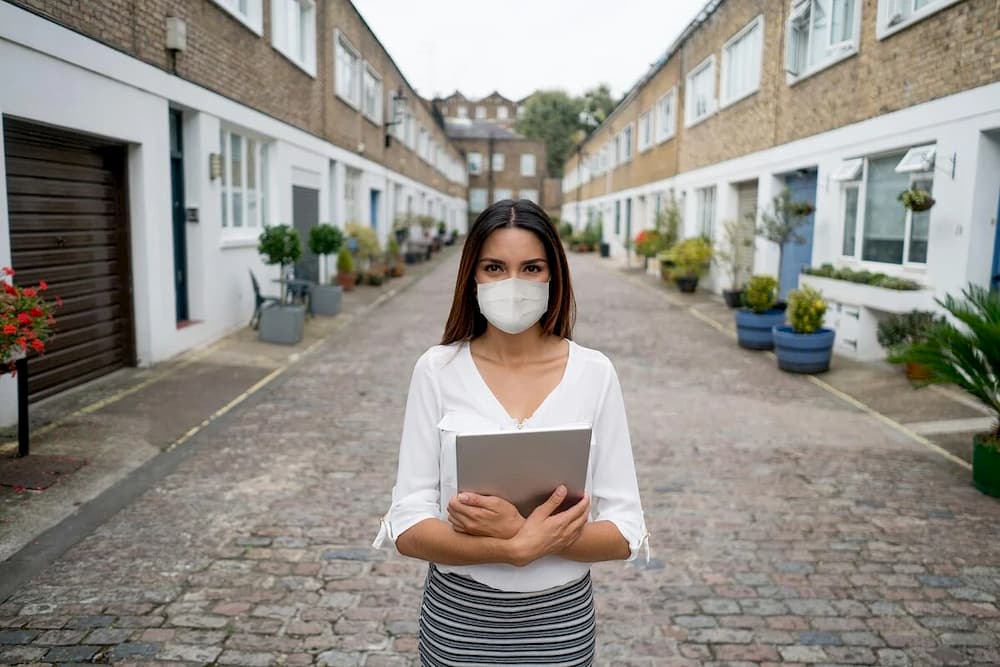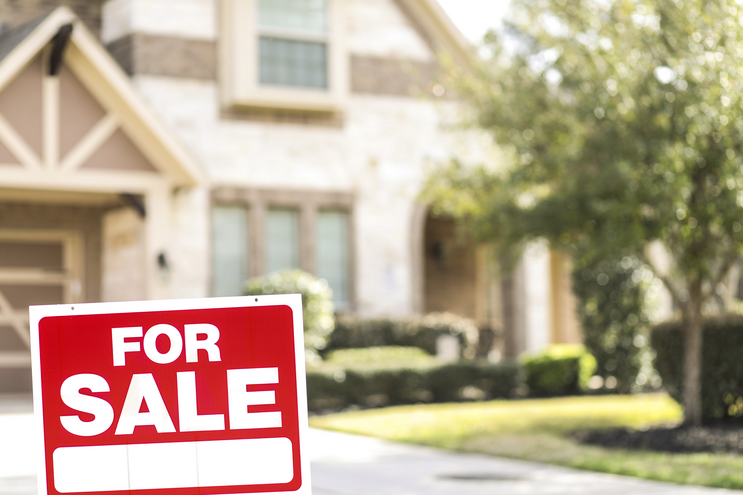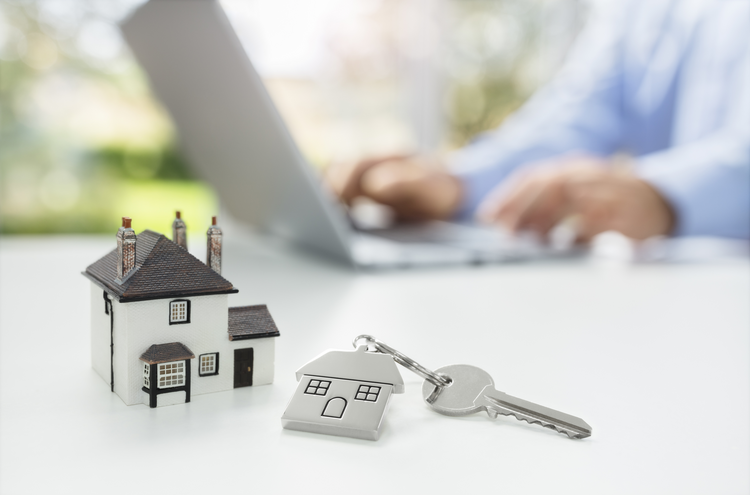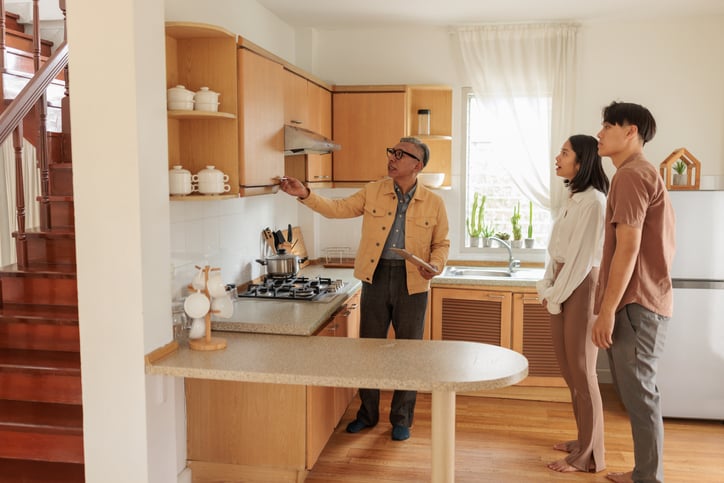This article was updated on February 2, 2022
The new year is here and we are still living in a pandemic. In real estate, agents still face the challenges that come with a house showing in person. While regulations vary across the country, safe, in-person showings are possible for those who are able to gather.
Read on to learn how to do home staging safely as we continue to navigate the COVID-19 crisis.
10 Tips for home showing during the pandemic
Please be advised that the following tips for showing a house are general in nature. Currently, some parts of the U.S. are under fewer restrictions than others, but the situation in many states is constantly changing.
For the most up-to-date advice on workplace safety, consult the CDC's website or the World Health Organization's guidelines.
Tip #1: Ask owners and buyers if they're COVID-19 positive
This may seem like an obvious step to take, but an important aspect of mitigating everyone's health risk is to ask both your seller and your potential buyer(s) to tell you if they have COVID-19, or are experiencing any of the symptoms associated with COVID-19.
This isn't a fool-proof method for avoiding coronavirus exposure, as some COVID-19 carriers may not display any symptoms. However, it's a common-sense precaution.
If the home seller or prospective buyers reveal that they're COVID-19 positive, you do have a legal obligation to offer them your services, if you can do so without threatening your own safety or the safety of anyone else involved in the transaction. That means making reasonable accommodations for COVID-19 positive individuals when possible.
However, federal fair housing laws allow you to decline to perform home showings if they might result in you or someone else being exposed to COVID-19.
Tip #2: Comply with state and city regulations
Your state's governor or your local mayor may have issued special guidelines regarding business activity during this time.
Before showing your client's home, make sure you're aware of state and local executive orders regarding in-person home staging. Even if they're not prohibited, you may be required to take certain safety measures.
In addition, these regulations may differ depending on whether you want to show a vacant, owner-occupied, or tenant-occupied property. Some cities have implemented special accommodations designed to protect tenants' rights. A quick Google search should bring you up to speed on home showing requirements for your area.
Tip #3: Follow your seller's lead
You may be eager to do in-person showings of your client's home, but are they?
While your home seller may have consented to standard marketing activities in the listing agreement, the pandemic has made it much harder for typical marketing tactics, such as open houses, to take place.
Once your client says that they do or don't want to allow in-person showings of their property, be sure to get it in writing. If your client is ambivalent, alert them to alternate methods for how to show a house, such as 3-D property scans, live Skype tours, a virtual open house, and more.
Tip #4: Limit showings to qualified, serious buyers
Under normal circumstances, listings often attract casual interest from neighbors, home window-shoppers, and others who aren't really serious about buying a home. While you may have been happy to accommodate such individuals in the past, on the off-chance that you might be able to convert them into qualified leads, such practices are not pandemic-friendly.
Instead, screen potential buyers by:
- Only showing homes via appointment, never through open houses
- Asking potential homebuyers to do a virtual tour of the property before committing to an in-person showing
- Requesting a pre-qualification letter before setting the date for the potential buyer's in-person tour
Tip #5: Advertise on Nextdoor
This tip aligns with the advice above about limiting showings to qualified buyers. A hyperlocal neighborhood hub, Nextdoor gives real estate professionals access to an audience of mainly homeowners, without requiring followers or growing an online presence. In this respect, Nextdoor is drastically different from other networks, which provide fewer options for targeting your advertising exclusively to local, qualified leads.
To promote a listing on Nextdoor, create a free Business Page, then sign up as a Neighborhood Sponsor in your desired ZIP codes. You'll be able to post home listings, advertise, and connect with local buyers - which helps build your reputation as the go-to real estate agent in the area.
Tip #6: Exercise caution on owner-occupied properties
For evident reasons, sellers who consent to in-person house showings while they're still in residence may need careful handling.
In addition to checking up on your city's regulations regarding how to show a house that's owner-occupied, be prepared to go above and beyond, through safety measures like:
- Asking your seller to remain off-site during the showing
- Not scheduling showings during times when your community is at high risk for transmissions
- Asking interested buyers to take their own temperatures before going to in-person showings (and to not come in if they have a high temperature)
- Providing easy-to-access bottles of hand sanitizer throughout your client's home
- Fulfilling any special safety requests made by your client
Tip #7: Don't restrict children from showings; Do restrict visitor volume
For safety reasons, real estate professionals may be tempted to restrict children from attending home showings, but this understandable urge ought to be resisted.
According to the Fair Housing Act, such restrictions can actually be classified as discrimination. To be in compliance with the Fair Housing Act, real estate professionals cannot impose rules on interested buyers that are based on their familial status.
However, there are other ways in which you can control the way your client's property is viewed. Consider restricting your home showings to purchasers of record, or limiting the number of people you allow in your client's home at any given time.
When forming your guidelines, look to CDC-recommended best practices for expert advice.
Tip #8: Take precautions before showings
When thinking about how to show a house without potentially exposing anyone to COVID-19, bear in mind that you can take some of the most crucial measures before the showing even begins.
Such measures include:
- Requesting that potential buyers stay in their cars until you arrive - This reduces the amount of contact that your client and the potential buyers have, an important component of COVID-19 safety.
- Asking the homeowner or tenant to set the home up for contactless viewing - If you can, request that the current occupant of the property turn on all of the property's lights, open all its doors, open up all its cabinets, and pull aside all of its window treatments. This step will make it unnecessary for you or potential buyers to touch frequently used switches, handles, or knobs.
- For vacant properties, implement contactless viewing procedures yourself - If the property you're showing isn't occupied, you can prepare it for viewing yourself. Wash your hands, put on gloves, and then turn on the lights, open cabinets, etc. Ideally, potential buyers will be able to tour the property without touching anything.
Tip #9: Social distance during showings
To protect yourself and other parties during the home showing, follow social distancing guidelines.
These include:
- Asking all parties to stay six feet away from those who aren't household members
- Avoiding handshakes, hugs, and other types of embraces
- Having every visitor wash or sanitize their hands and take off their shoes before entering the home
- Not allowing visitors into the home unless they're wearing face masks and gloves
- Barring visitors from using the property's bathroom and touching handles, switches, and knobs
- Restricting visitors from sharing phones or pens during the showing
Tip #10: Sanitize the property after every home showing
To ensure that your client's property is safe for them to enter after the home showing, sanitize it by:
- Cleaning off any surfaces that may have been touched with a disinfecting wipe
- Going over the client's key and a lockbox with a disinfecting wipe
- Use hand sanitizer on your own hands after these procedures
- Following up electronically with potential buyers and the seller, rather than speaking in person or swapping physical paperwork
- Arranging for future transactions to take place via phone or video chat
- Keeping a contract-tracing record of all your home showing interactions at the property, including each home showing's date, the names of the potential buyers who attended it, and their contact information
The Bottom Line For Home Showings
Selling a home or property during the pandemic is possible, especially if you take practical steps to protect the health of everyone involved in the transaction. These include:
- Complying with your state and city's pandemic regulations
- Following your seller's lead with regard to how you advertise their home
- Limiting in-person home showings to serious or qualified buyers
- Restricting visitor volume, rather than certain types of visitors, such as children
- Taking precautions before home showings
- Social distancing during home showings and other types of transactions
- Sanitizing the property after every showing
By taking these actions, you'll ensure safer home showings for both your sellers and their potential homebuyers.
Additional sources:
National Association of Realtors®. Coronavirus: A Guide for REALTORS®. https://www.nar.realtor/coronavirus-a-guide-for-realtors
Realtor.com. How Do You Sell a Home Safely During the COVID-19 Crisis? Here Are the Steps To Take. https://www.realtor.com/advice/sell/is-it-safe-to-sell-your-home-during-the-coronavirus-pandemic/
Claim your free Business Page to get started on Nextdoor. For resources on how to use Nextdoor to stay connected with your local customers, pertinent news affecting businesses, and more, follow us at @nextdoorbusiness on Facebook.








